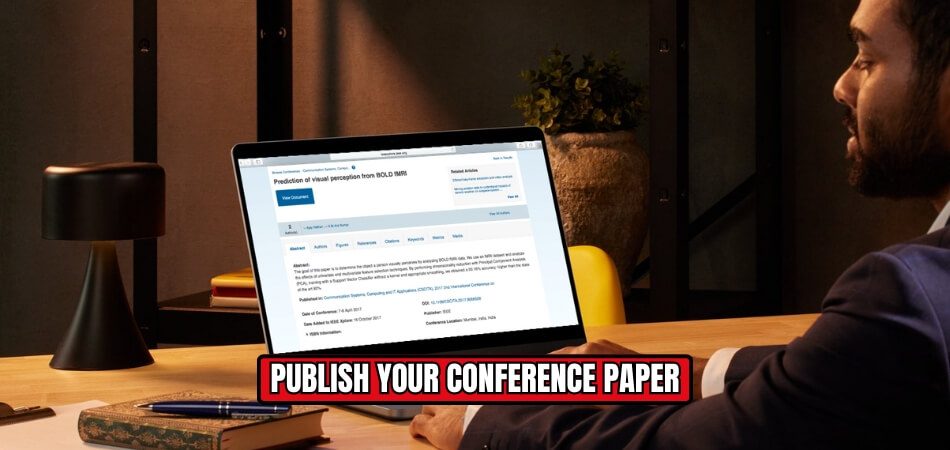Have you recently presented a conference paper and are now wondering, “Where can I publish my conference paper?” You’re not alone! Turning your research into a published piece is a rewarding step that improves your professional reputation and expands your impact within the academic community. But where do you start?
Fortunately, there are several publishing avenues—ranging from scholarly journals and conference proceedings to open-access platforms—each designed to give your work the recognition it deserves. Finding the right fit, however, depends on your research field, audience, and long-term goals.
In this guide, we’ll walk you through the best publication options, offer practical submission tips, and help you make your research visible to a global audience. Let’s get started!
Significance of Publishing Conference Paper
Publishing your conference paper is more than just an academic achievement—it’s a powerful step that can significantly boost your career, credibility, and research influence. It doesn’t just demonstrate your dedication; it opens new opportunities for learning, collaboration, and professional growth.

Improves Professional Credibility
It establishes your credibility as a researcher within your field when you publish your conference paper. It shows that your findings are not only relevant but also valuable to the academic and professional community. This can upgrade your reputation, making you a respected voice in your area of expertise.
Expands Research Impact
Your paper can be read, cited, and built upon by others when you publish it. Among the benefits of publishing in conference paper is that it amplifies your research’s visibility and contributes to the collective knowledge of your field. It positions you as a contributor to ongoing discussions and developments.
Increases Networking Opportunities
It’s beneficial to publish in order to meet other researchers, professionals, and potential collaborators. It serves as an icebreaker for discussions, leading to invitations to collaborate, speak at events, or contribute to future projects. Networking through your publications can lead to significant advancements in your career.
Strengthens Academic Portfolio
Having a published paper adds substantial weight to your academic portfolio. It’s an asset whether you’re pursuing further education, seeking grants, or applying for jobs. A strong publication record is often a key factor that organizations consider when evaluating candidates for positions or promotions.
Contributes to Personal Growth
The art of writing, editing, and researching for publication requires a great deal of practice. This process not only improves your expertise but also increases your confidence as a scholar. With every published paper, you’ll become more adept at communicating complex ideas clearly and effectively.
So, presenting your conference paper is a step toward developing yourself both professionally and personally. It’s not just about adding a line to your CV—it’s about making a lasting impact.
Where Can I Publish My Conference Paper?
You can significantly boost your academic profile and contribute to your field of expertise by publishing a conference paper. The right publication venue for conference paper publication can increase the visibility of your research and encourage academic collaboration. Listed below are a few effective platforms where you can publish your work:
You can make a huge impact on your academic or professional career by publishing your conference paper. It not only allows you to share your findings with a broader audience but also adds credibility to your work. Let’s explore the most effective options for getting your paper published.
Conference Proceedings
Conference proceedings are often the first and most straightforward option for publishing your paper. Many conferences offer an opportunity to include your work in their proceedings, which are distributed to participants and indexed in digital databases.
As a result, you can increase your visibility among peers in your field and pave the way for further collaborations to take place in the future.
Peer-Reviewed Journals
Submitting your paper to peer-reviewed journals is a strong choice if you want your research to be widely recognized. These journals offer a rigorous review process that adds credibility and scholarly value to your work.
By participating in reliable conferences held across various regions, such as international conferences in Canada, you are likely to have your paper better prepared for submission, as it will have already undergone initial evaluation.
Open-Access Journals
The key to making your research easily accessible is to publish it in an open-access journal if you want it to be easily found.
These platforms make your work available to anyone, allowing for a broader readership and higher citation potential. However, they may require a publication fee, so consider your budget before opting for this route.
University Repositories
Many universities offer repositories for conference papers, theses, and other academic work. Publishing your paper in such a repository ensures it remains accessible to researchers and students within the university’s network.
It’s an effective way to maintain the paper’s integrity and ensure it gets noticed by scholars interested in your research area.
Academic Networking Platforms
There are various academic networking platforms where researchers can share their papers, receive feedback, and connect with a global scholarly community. Uploading your conference paper on these platforms can improve your visibility and open opportunities for future collaborations.
While this approach doesn’t count as formal publication, it’s an effective way to gather insights, refine your work, and prepare it for official journal submissions.
Specialized Journals
If your research is niche-specific, look for journals that specialize in your field. These journals often have a more targeted audience, increasing the chances of your paper being read by researchers who share your interests.
This option can provide your work with the attention it deserves, leading to potential citations and deeper discussions in your field.
Finding the right publication for your conference paper can significantly enhance your academic profile and extend your research’s impact. Choose the option that best aligns with your goals and target audience, and remember—publishing is a journey, not just a destination.
Is It Easy to Publish a Conference Paper?
The process of publishing a conference paper involves several factors; it is not always straightforward. The difficulty depends on the field of study, the conference’s prestige, and the paper’s originality. Depending on each aspect, publishing processes can be challenging. Here are some factors that affect the publication process:
Quality of Research
The fundamental requirement for publishing a conference paper is the quality of your research. Your study should offer valuable insights and be methodologically sound. Papers that contribute new knowledge or perspectives stand out. Make sure your findings are well-supported and clearly explained.
Relevance to Conference Themes
Your paper must align with the conference themes and focus areas. Review the conference’s call for papers carefully to match your topic. Papers that closely align with the conference’s scope are more likely to be accepted. It’s important to tailor your submission to fit these guidelines.
Preparation of Manuscript
Preparing your paper according to conference guidelines is crucial. This includes formatting, style, and all required sections. Attention to detail in your manuscript preparation can significantly impact acceptance. Poorly prepared papers are often rejected regardless of their content quality.
Peer Review Process
Your paper will typically undergo peer review before acceptance. This process assesses the paper’s originality, significance, and rigor. Feedback from reviewers can improve the overall quality of your paper. The peer review process also ensures that only high-quality papers are published.
Publishing a conference paper may seem challenging at first, but with the right approach, it can be a rewarding experience. Stay persistent, follow the guidelines, and your work will find its place in the academic world.
Steps You Can Take to Publish Your Conference Paper?
A structured approach simplifies the publication process for your conference paper. You will have a better chance of getting your work published if you follow these steps. Here are some practical steps you can take to publish your conference paper effectively:
Step 1: Select the Appropriate Publication Media
Identify where your research fits best. This could be a specialized journal, conference proceedings, or an academic repository. Choosing the appropriate venue is crucial as it directly influences your research’s reach and impact.
Step 2: Prepare According to Guidelines
Every publication media has specific submission guidelines. These may include formatting, style, and referencing rules. When submitting a paper to a conference, adhering to these guidelines is essential, as failure to do so is one of the common reasons for initial rejection.
Step 3: Peer Review Readiness
Prepare your paper for a thorough peer review process. Ensure your argument is well-structured, and your data supports your conclusions effectively. Consider having a colleague review it beforehand to catch any potential issues that reviewers might focus on.
Step 4: Revise Thoroughly
Revise your paper based on the peer review feedback. Be thorough in addressing all comments and suggestions. This revision phase is often iterative, involving several rounds of modifications to satisfy all review conditions.
Step 5: Proofreading
Conduct a final proofreading after revisions. This step ensures your paper is free from grammatical errors and formatting issues. It’s beneficial to have another set of eyes look over your work to catch errors you missed.
Step 6: Submission
Once your paper meets all the required standards and is polished, submit it. Follow the specific submission process of the chosen publication venue, which might include online forms and multiple document uploads. After submission, be prepared for a waiting period as the final review process can vary in length.
By diligently following these steps, you can effectively manage the complex publishing process.
Common Mistakes to Avoid When Submitting Your Conference Paper
Submitting your conference paper is an exciting milestone, but even minor mistakes can hinder your chances of success. To increase your chances of getting published, it’s essential to avoid common mistakes.
Ignoring Submission Guidelines
Every conference has specific submission guidelines that must be followed. Failing to adhere to formatting, word count, or referencing requirements often results in immediate rejection. Take the time to thoroughly review and apply these guidelines before submitting.
Inadequate Proofreading
Spelling errors, grammar mistakes, and formatting issues can make your paper appear unprofessional. Even if your research is strong, poor presentation can lower your credibility. Proofread carefully, and consider having a colleague or mentor review your paper for additional feedback.
Weak Abstract or Introduction
Your abstract and introduction are the first impressions of your paper. If they fail to capture attention or clearly convey your research’s purpose, reviewers might lose interest quickly. Focus on making these sections engaging and clear to encourage further reading.
Lack of Structure or Coherence
A well-structured paper with clear headings and logical flow is more likely to be accepted. Avoid jumping between ideas without proper transitions, as this can confuse readers. Use a clear outline and stick to it to maintain coherence throughout your paper.
Ignoring Reviewer Feedback
If you receive feedback from reviewers, not addressing their concerns is a major mistake. Be open to suggestions, and revise your paper thoroughly to reflect the recommended changes. This demonstrates your willingness to improve and increases your chances of acceptance.
Avoiding these mistakes will enhance your paper’s quality and increase your chances of publication. Stay focused, keep refining, and you’ll set yourself up for success.
Frequently Asked Questions About Where Can I Publish My Conference Paper?
When considering where to publish your conference paper, you might have additional questions that go beyond the basic process. To help you make more informed decisions, here are some frequently asked questions that often arise among researchers.
Can I Publish My Conference Paper In Multiple Journals?
No, you cannot publish the same conference paper in multiple journals simultaneously. This is considered unethical and could lead to the withdrawal of the paper from all venues. However, you can expand your conference paper into a more detailed journal article, provided you disclose its prior publication status.
Do I Need To Pay A Fee To Publish My Conference Paper?
It depends on the publication venue. Some journals, especially open-access ones, require a publication fee. On the other hand, some conferences and journals publish papers for free, especially if they are supported by academic institutions or sponsors.
Is It Possible To Publish A Conference Paper As A Book Chapter?
Yes, converting your conference paper into a book chapter is a viable option. You may need to expand the content and structure it to fit the book’s requirements. This option allows for deeper exploration of the topic and can reach a different audience.
How Long Does It Take For A Conference Paper To Get Published?
The timeline varies depending on the publication venue and review process. It can take anywhere from a few weeks for conference proceedings to several months for journal submissions. Be prepared for revisions and delays as part of the process.
Can I Publish My Paper In An International Journal If It Was Presented At A National Conference?
Yes, you can submit your paper to an international journal even if it was first presented at a national conference. However, make sure to disclose its initial presentation and make necessary revisions to meet the journal’s standards. This approach helps your work gain broader recognition.
Conclusive Words
Deciding where to publish your conference paper is an important step that can significantly impact your research journey. With the right venue, your work can reach a wider audience, gain credibility, and spark meaningful discussions in your field. Remember, choosing the right platform is key.
Explore various options, from journals and conference proceedings to open-access platforms and university repositories. Each venue offers unique benefits, so match your goals with the publication’s focus to ensure success.
Wherever you decide to publish, stay diligent in following submission guidelines, peer review processes, and revisions. This effort will pay off as your research contributes to the academic community. So, take the plunge and get your work out there.







